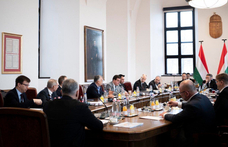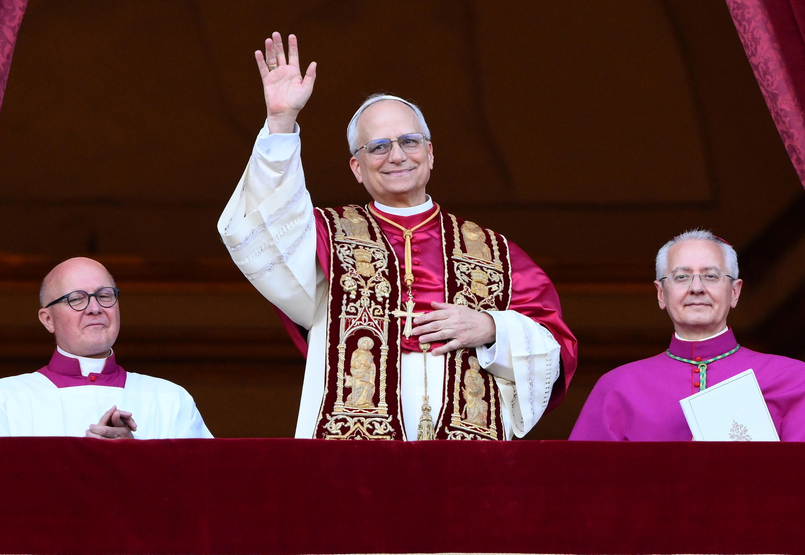"Without privatisation, the economy would have collapsed."
The budget deficit can no longer be allowed to leap skywards in every electoral year, according to Arpad Kovacs, the 59-year-old president of the State Audit Office (ASZ), who is a cautious supporter of the idea of establishing an independent budgetary supervision authority.
The State Audit Office (ASZ) has responded to the implementation of the 2006 budget and last year's privatisations with its most critical report yet. Its president, Arpad Kovacs, who has been in the post for 10 years, is an engineer-economist who served as president of the state privatisation organisation in 1996 and 1997, a post he was appointed to after a previous stint as a senior ASZ official. Kovacs, who studied in America and in Brussels, has been president of Intosai, the international association of audit offices, since October 2004.
HVG: Has your patience come to an end? Why have you been so critical of this year's budget and last year's privatisations?
Á.K.: I don't think this year was very different. The difference is perhaps that there was a lot of tension last year, much of which resulting from things that happened in 2005. For example, it was no coincidence that we criticised the privatisation of Budapest Airport. It became clear that the 2005 budget was rescued by the sale of the airport, but this came at a cost to the 2006 budget. I actually think the economy would have collapsed by now if it weren't for privatisations. The revenues were enough to fill the holes in the budget and pay for inefficient services. Everything that happened in 2006 shows how important it is to create clear rules about what the state can take responsibility for, how much the central budget has to support.
HVG: That's why you're an enthusiast for a rule-based budget?
Á.K.: Today, nobody can say what the financial impact of a given law is. The consequences of a law are never examined systematically, even though the law on legislation says this should happen. What's happening is that there are negotiations between the parties about setting up a new institution - the Parliamentary Budget Office, but we still don't know how much it'll cost and what it's going to do.
HVG: But it looks like we'll have that office before we have a system of rules for the budget.
Á.K.: We take a logical approach to this. You have first to decide what the budgetary rules are, setting an expenditure ceiling for several years in advance, the rate at which the the public debt-GDP ratio has to fall, and making sure that each law is properly budgeted for. If you've done that, you can start discussing the control mechanisms, the structural framework - do we need a new office, maybe a budgetary council, or can the ASZ do this?
HVG: As boss, aren't you fighting for these functions to be kept with the ASZ?
Á.K.: No, for our peace of mind it would be very welcome if these functions could be taken as far away from us as possible.
HVG: That sounds plausible, but we also know that auditing the budget costs you 22,000 person-days every year. It's hard to turn down a commission of that size.
Á.K.: There'd still be plenty for us to do. The real question is whether the new office should focus only on macroeconomic issues, or whether it will also deal with examining planning mechanisms in each ministry, running through each law with a fine tooth-comb, as we do currently. The reason we devote so much time to that one task is that our staff are examining the planning activities of each ministry, working out if they are sticking to the guidelines, are they completing their assigned tasks, whether the tax authorities are carrying out proper risk assessments on whether they can collect taxes in full or not.
HVG: And do you get it done?
Á.K.: On the whole, no. Today, we carry out all of these tasks in detail, and if that remains the same, the new office won't be able to do it any more quickly than we can. But Parliament could say that the budgetary office need only look at the processes on a macro level, only examining the changes in deficit and debt indicators. That's what the argument is about. I think we still need the same planning and auditing work, and it's not enough for a few wise men to decide if the guideline figures in the budget are realistic or not.
HVG: If a decision is taken this year, the budgetary office could be set up next year, but it would only begin real work in 2009, when your own term as ASZ president expires. Would you like to head this office?
Á.K.: The job specification in the current drafts of the law is not suited to me. I'd hazard that I'm pretty strong on public administration and on the technology of auditing, but I'm not a macroeconomist. But if it's not a budget office but an independent budgetary council without its own independent staff, and if ASZ is tasked with functioning as the council's secretariat, and ASZ's president is also a member of the council, then things look completely different. But I'll repeat it: the fundamental problem is that no decision has been taken on what the council's or the office's task will be.
HVG: So it would make sense for its remit to be broader than ASZ's - having the right to reject implausible budgets.
Á.K.: That's the key question, because if that's how it works, then there is a chance of sticking to the budgetary rules. But it's not that simple, because what happens if Parliament decides that, though they don't have the money to raise the pension, a rise can be delayed no longer. The office can't contend with the sovereignty of parliament. Or what if Parliament decides that public debt has to be cut to the right level not in three years but in thirty? The office would have to be able to say no in certain circumstances. If the new institution gets a broader remit, and can do more than ASZ after 17 years, then let's do it. Let's just get away from this custom of seeing overspending and parties outbidding each other in their spending promises every fourth year - because we can't get away with it for a third time.
HVG: So far, ASZ has stayed out of party politics, and neither side has criticised it. But in the spring, it was announced that Tamas Katona and Ildiko Vida would serve as your deputies. Both are linked to previous governments. Is it the end of the idyll?
Á.K.: Both are experienced professionals, though I would like my deputies to be chosen from among my colleagues. I think it would be regrettable if we moved towards a more politicised system, even though several European countries are doing just that. I was recently in Moldova, where all seven members of the audit council are appointed by one political party or another. There's no problem with that so long as all the parties agree on the country's main aims and cooperate in the light of this - but only if that situation obtains.
HVG: How could Tamas Katona have audited the implementation of last year's budget if he was responsible for implementing part of it as a political state secretary?
Á.K.: All I can say is that when I returned from the privatisation agency to the audit office, I resiled from all matters relating to privatisation audits. It's not a party political problem, but one of compatibility. There's no question that you have to work as a specialist for several years before you can get over your previous allegiances.
HVG: Have you seen this happen?
Á.K.: You've got me there. If party allegiance is not just about interests and daily party politics, but about a difference in attitude and moral code, then it's difficult to get away from it. I can't get away from - I don't want to - my left-wing, social democrat beliefs. I've learned the laws of globalisation, the principles of liberal economics, and I know about self-reliance, but I'm still sticking with my vision of a state which feels a deep social responsibility. Why didn't we get involved in party politics? Because we are a team, and our work is impersonal. We may miss something because the auditor didn't spot it, but we'd never report on something that didn't happen.
ZOLTÁN FARKAS
Arpad Kovacs, president of the State Audit Office © Túry Gergely |
Á.K.: I don't think this year was very different. The difference is perhaps that there was a lot of tension last year, much of which resulting from things that happened in 2005. For example, it was no coincidence that we criticised the privatisation of Budapest Airport. It became clear that the 2005 budget was rescued by the sale of the airport, but this came at a cost to the 2006 budget. I actually think the economy would have collapsed by now if it weren't for privatisations. The revenues were enough to fill the holes in the budget and pay for inefficient services. Everything that happened in 2006 shows how important it is to create clear rules about what the state can take responsibility for, how much the central budget has to support.
HVG: That's why you're an enthusiast for a rule-based budget?
Á.K.: Today, nobody can say what the financial impact of a given law is. The consequences of a law are never examined systematically, even though the law on legislation says this should happen. What's happening is that there are negotiations between the parties about setting up a new institution - the Parliamentary Budget Office, but we still don't know how much it'll cost and what it's going to do.
HVG: But it looks like we'll have that office before we have a system of rules for the budget.
Á.K.: We take a logical approach to this. You have first to decide what the budgetary rules are, setting an expenditure ceiling for several years in advance, the rate at which the the public debt-GDP ratio has to fall, and making sure that each law is properly budgeted for. If you've done that, you can start discussing the control mechanisms, the structural framework - do we need a new office, maybe a budgetary council, or can the ASZ do this?
HVG: As boss, aren't you fighting for these functions to be kept with the ASZ?
Á.K.: No, for our peace of mind it would be very welcome if these functions could be taken as far away from us as possible.
HVG: That sounds plausible, but we also know that auditing the budget costs you 22,000 person-days every year. It's hard to turn down a commission of that size.
Á.K.: There'd still be plenty for us to do. The real question is whether the new office should focus only on macroeconomic issues, or whether it will also deal with examining planning mechanisms in each ministry, running through each law with a fine tooth-comb, as we do currently. The reason we devote so much time to that one task is that our staff are examining the planning activities of each ministry, working out if they are sticking to the guidelines, are they completing their assigned tasks, whether the tax authorities are carrying out proper risk assessments on whether they can collect taxes in full or not.
HVG: And do you get it done?
Á.K.: On the whole, no. Today, we carry out all of these tasks in detail, and if that remains the same, the new office won't be able to do it any more quickly than we can. But Parliament could say that the budgetary office need only look at the processes on a macro level, only examining the changes in deficit and debt indicators. That's what the argument is about. I think we still need the same planning and auditing work, and it's not enough for a few wise men to decide if the guideline figures in the budget are realistic or not.
HVG: If a decision is taken this year, the budgetary office could be set up next year, but it would only begin real work in 2009, when your own term as ASZ president expires. Would you like to head this office?
Á.K.: The job specification in the current drafts of the law is not suited to me. I'd hazard that I'm pretty strong on public administration and on the technology of auditing, but I'm not a macroeconomist. But if it's not a budget office but an independent budgetary council without its own independent staff, and if ASZ is tasked with functioning as the council's secretariat, and ASZ's president is also a member of the council, then things look completely different. But I'll repeat it: the fundamental problem is that no decision has been taken on what the council's or the office's task will be.
HVG: So it would make sense for its remit to be broader than ASZ's - having the right to reject implausible budgets.
Á.K.: That's the key question, because if that's how it works, then there is a chance of sticking to the budgetary rules. But it's not that simple, because what happens if Parliament decides that, though they don't have the money to raise the pension, a rise can be delayed no longer. The office can't contend with the sovereignty of parliament. Or what if Parliament decides that public debt has to be cut to the right level not in three years but in thirty? The office would have to be able to say no in certain circumstances. If the new institution gets a broader remit, and can do more than ASZ after 17 years, then let's do it. Let's just get away from this custom of seeing overspending and parties outbidding each other in their spending promises every fourth year - because we can't get away with it for a third time.
HVG: So far, ASZ has stayed out of party politics, and neither side has criticised it. But in the spring, it was announced that Tamas Katona and Ildiko Vida would serve as your deputies. Both are linked to previous governments. Is it the end of the idyll?
Á.K.: Both are experienced professionals, though I would like my deputies to be chosen from among my colleagues. I think it would be regrettable if we moved towards a more politicised system, even though several European countries are doing just that. I was recently in Moldova, where all seven members of the audit council are appointed by one political party or another. There's no problem with that so long as all the parties agree on the country's main aims and cooperate in the light of this - but only if that situation obtains.
HVG: How could Tamas Katona have audited the implementation of last year's budget if he was responsible for implementing part of it as a political state secretary?
Á.K.: All I can say is that when I returned from the privatisation agency to the audit office, I resiled from all matters relating to privatisation audits. It's not a party political problem, but one of compatibility. There's no question that you have to work as a specialist for several years before you can get over your previous allegiances.
HVG: Have you seen this happen?
Á.K.: You've got me there. If party allegiance is not just about interests and daily party politics, but about a difference in attitude and moral code, then it's difficult to get away from it. I can't get away from - I don't want to - my left-wing, social democrat beliefs. I've learned the laws of globalisation, the principles of liberal economics, and I know about self-reliance, but I'm still sticking with my vision of a state which feels a deep social responsibility. Why didn't we get involved in party politics? Because we are a team, and our work is impersonal. We may miss something because the auditor didn't spot it, but we'd never report on something that didn't happen.
ZOLTÁN FARKAS


















